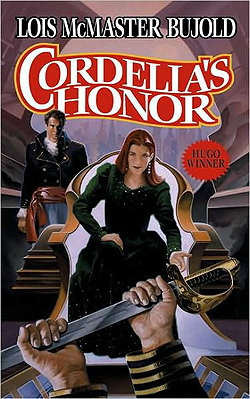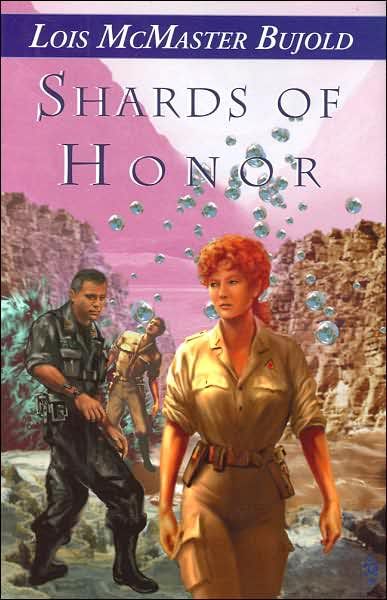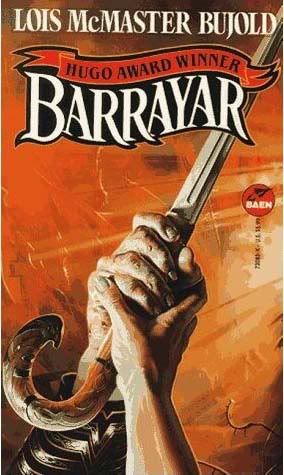Bujold, Lois McMaster: Cordelia's Honor

Cordelia's Honor (1996)
Written by: Lois McMaster Bujold
Genre: Science Fiction
Pages: 596 (Mass Market Paperback)
Series: Miles Vorkogisan Saga

Why I Read It: I've heard for a very long time how wonderful and excellent Bujold's SF is, but every time I sought it out, it was all ugly covers and mostly out of print. Furthermore, I had no idea where to start the darn series, as there were so many titles, and despite being assured I could read the books in any order, I'm a sucker for some kind of chronological order (be it publication order or following the timeline of the series). So I was lost in terms of trying Bujold at what I've been promised is her best. So I was thrilled when TJ selected Cordelia's Honor for the Women of Science Fiction book club, because it gave me just the kick in the pants I needed to give this series a shot.
The premise: ganked from BN.com: In her first trial by fire, Cordelia Naismith captained a throwaway ship of the Betan Expeditionary Force on a mission to destroy an enemy armada. Discovering deception within deception, treachery within treachery, she was forced into a separate peace with her chief opponent, Lord Aral Vorkosigan-he who was called "The Butcher of Komarr"-and would consequently become an outcast on her own planet and the Lady Vorkosigan on his.
Sick of combat and betrayal, she was ready to settle down to a quiet life, interrupted only by the occasional ceremonial appearances required of the Lady Vorkosigan. But when the Emperor died, Aral became guardian of the infant heir to the imperial throne of Barrayar-and the target of high-tech assassins in a dynastic civil war that was reminscent of Earth's Middle Ages, but fought with up-to-the-minute biowar technology. Neither Aral nor Cordelia guessed the part that their cell-damaged unborn would play in Barrayari's bloody legacy.
Spoilers, yay or nay?: Heck to that yeah. Skip to "My Rating" if you want to stay spoiler free, because I'm going to spoil the bejesus out of this omnibus. And, to keep discussion straight, I'll be breaking the review down into its smaller parts: one section will be for Shards of Honor, the other for Barrayar. Everyone who's read the book, onward!

Shards of Honor (1986)
So thanks to the cover of this particular book, I'd been more reticent than usual to pick it up. I didn't even realize that this portion of the omnibus matched that particular cover, given that I've seen individual reviews for Shards of Honor around the webs, and it really turned me off of the book. Of course, this isn't the place to talk about the cover, I do that at the end of the review! The point was that it made this particular book look TOO much like a science-fiction romance, and I was rather burned out on such a thing.
But I've got to give Bujold credit, because while yes, this particular book IS indeed an SFR, it's very well handled. First of all, the characters don't give into their passions like lusty teenagers. These are adults. A man and a woman who have their own individual pasts, own individual burdens, and their own distinct personalities. It was fascinating to watch how Cordelia and Aral played off of each other, how they learned things about each other and each other's home. Surprisingly, I really enjoyed how Bujold incorporated "honor" into a real way of life without it being corny or cheesy or just plain melodramatic. It works well. If one of these two characters says they'll do something, they'll do it, or at least be honest when they have to do something else.
I also liked how Cordelia isn't wholly a damsel in distress. Sure, there's the scene with Vorrutyer and Bothari decides to slice a superior's throat rather than let the man rape Cordelia, but she uses her head to get out of other bad situations in the book, and manages to save people in the process, which is quite admirable. I love the way Vorkosigan describes her early in the book (page 49):
"You're not what I expected a female officer to be."
"Oh? Well, you're not what I expected a Barrayaran officer to be, either, so I guess that makes two of us." She added curiously, "What did you expect?"
"I'm -- not sure. You're as professional as any officer I've ever served with, without once trying to be an, an imitation man. It's extraordinary."
That might rub some feminists the wrong way, but it IS extraordinary. Watch any SF television series or film and pay attention to the female action heroes. Hell, it doesn't even have to be SF. Just pick anything with a female action hero. While I'm not going to say this applies in the MAJORITY of cases, often, the heroines are portrayed simply as men with boobs. I've seen that critique launched at Starbuck in Battlestar Galactica, and I think I've applied that criticism myself to heroines in various SF action novels (of course, ask me to name one and I'll draw a blank. I am now, even!). I don't know why it's so hard to write women: they're either men with boobs or bitchy, all because they're meant to be portrayed as bad-ass. The other direction is tricky too: you don't want to get TOO feminine, otherwise she's merely a type and not a person. So creating a well-rounded, female character in fiction is in and of itself a great thing, but to have one in an SF novel, who earns that distinction that Vorkosigan observed? Yes, that's extraordinary. Lesser writers would do more to make Cordelia a bad-ass, and the result would be a lessened character.
Bujold also does a fantastic job with world-building and giving the reader necessary information without just dropping it in your lap. For example, we learn more about Cordelia's homeland when she's comparing something different to her own world. For example, page 78:
Its narration was as banal as the title had promised, but the pictures were utterly fascinating. It seemed a green, delicious, sunlit world to her Betan eyes. People went without nose filters or rebreathers, or heat shields in the summer. The climate and terrain were immensely varied, and it had real oceans, with moon-raised tides, in contrast to the flat saline puddles that passed for lakes at home.
This passage is describing Barrayar, but it describes so much about Cordelia's homeworld with just a few key phrases. Bujold uses this technique quite well, and this technique is used to even better effect in the latter half of the omnibus, in Barrayar.
And the romance works well. Oh, don't get me wrong, the proposal was a little out of left field, but given what we'd learned of Vorkosigan and his culture to that point, it rather made sense to me. And talk about a wonderfully romantic moment that doesn't involve kissing or sex (page 132):
"It isn't exactly like waking from the nightmare, to see your face." He touched it gently, fingertips on the curve of her jaw, thumb laid a moment across her lips, lighter than a kiss. "More like, knowing, while dreaming still, that beyond the dream there is a waking world. I mean to join you in that waking world, someday. You'll see. You'll see."
Even though I'm a reader quite tired of clichéd romances and love triangles and the like, Bujold knows how to make it WORK, and this is just gorgeous. Especially since it's noted later by another character, who doesn't believe there's anything romantic between Cordelia and Vorkosigan, "A middle-aged career officer is hardly the stuff of romance" (page 198).
I'll be honest: those scenes on the Beta Colony were rather frightening. They were so convinced that Cordelia's mind had been drastically altered that I started to doubt even the pages I read. I love how we get to see both the good and the bad of both sides, and it's rather Romeo & Juliet, no? Except fortunately, here no one kills themselves (see, not a teen romance!). No, instead Cordelia makes quite the great escape, and seeing her follow her heart made all the sense in the world, which bodes well as a precursor to Barrayar. I love Vorkosigan's reaction when he realizes she's really there!
Overall, Shards of Honor is quite solid as an SFR without being distasteful in any way. I should also note that the only thing I know about the series as a whole is that there's a hero named Miles Vorkosigan who's brilliant but crippled. So I knew this was a prequel of sorts, but had no expectations, nor did I feel that anything was lacking in regards to my understanding of what's going on and why. This is an easy book to recommend.

Barrayar (1991)
Barrayar picks up almost right where Shards of Honor left off, so making this an omnibus really makes sense in that regard. Still, there's clues they're separate books, published some years apart. There's a bit of exposition to catch you up in case this is your first book in the series, but Bujold handles it well enough that it didn't annoy me, even though I read the two "books" back to back. I was more disturbed, actually, by Cordelia's doubts in leaving home. She seems to have more of them in this installment, and that bugged me a bit. Don't get me wrong, I don't expect things to be perfect, but even without the doubts, things are FAR from perfect. Granted, Cordelia's doubts make her a little more human, a little more well-rounded, and there is something to be said about how her arrival and the few weeks, maybe month afterward, might've felt like an extended vacation, but as the realities of her new life and her title and this new culture set in, she starts to see things in a new light. I guess it works. It just bugged me a bit.
As I mentioned earlier, Bujold does a great job revealing Beta Colony culture without us getting an info dump or being on the Beta Colony. There are so many instances where Cordelia notes the way things are done on Barrayar, and considers how differently things are done at home. Notably the difference in pregnancy and birthing. Cordelia comes from quite a fascinating culture, and at times I wished we were on the Beta Colony just to SEE these things, but perhaps it wouldn't have been quite as vivid if not for the comparison to Barrayar. We wouldn't get such the succinct picture as this, on page 298:
Cordelia had always assumed that when her turn came, she'd have her own kid cooked up in a replicator bank at the start of a Survey mission, to be ready and waiting for her arms upon her return. If she returned -- there was always that possible catch, exploring the blind unknown. And assuming, also, that she could nail down an interested co-parent with whom to pool, willing and able to pass the physical, psychological, and economic tests and take the course to qualify for a parent's license.
Yes, Betan culture fascinates me. According to Vordarian (yes, all the Vors are hard to keep up with), Beta Colony has even figured out how to bioengineer hermaphrodites (page 331)!
I will stress that even though I've yet to meet Miles outside of his cameo in this book (in other words, I'm not fascinated by the backstory for the sake of backstory), I was really engaged with Cordelia's experiences with pregnancy and impending motherhood. It's never sentimental, which I appreciate, and I also appreciate how Cordelia's feelings towards the whole matter are a little conflicted and also scared. Again, we're not seeing a stereotypical female, but rather a real person with real reactions and real fears. Even though I've never been pregnant myself, I can really relate to her, whereas lesser authors would take it for granted that all women would immediately relate, and not bother creating a situation where men could sympathize, thereby nudging the book further into "girly-SF" rather than SF that can be enjoyed by anyone and everyone. I guess I can't stress my appreciation for Bujold's abilities enough. I'd not read her before this year (my first Bujold was her fantasy The Curse of Chalion), but there's much to admire about her style, her pacing, her characterization, her world-building. I'm starting to be awed.
Just look at this sentence (page 474):
You should have fallen in love with a happy man, if you wanted happiness. But no, you had to fall for the breathtaking beauty of pain . . . .
While I had my doubts about Cordelia's doubts (ha-ha), this is a place where her doubts really worked.
The overall story is quite strong. Even the subplots engaged me, especially when those subplots intersected with the main story (Bothari is fascinating, and I hope he sticks around in the Miles series). Cordelia's fight for herself and her son and her future was quite powerful, especially at the end. Someone writing a female action hero who's really a "man with boobs" would've had Cordelia deliver the killing stroke, but that would mean missing out on all the psychological awesomeness and subtlety that is her telling Bothari to kill, and what it means to HER as a character, and what it means for Bothari when he follows through. Oh, that was powerful stuff. And her bringing Vordarian's head as a trophy was fantastic. I'm really looking forward to reading about Cordelia from Miles' POV, because I can't wait to see how she's seen from the outside, you know?
Oh, and Miles. He shows up at the end, most notably in the Epilogue, and already, he shines off the page. This particular book was written after Bujold had written a few Miles novels, and it's clear she loves this character to pieces. And sue me, I'm hooked. I'm ready to keep reading in this world, and I never that that'd be the case.
My Rating: Excellent
When I originally finished Cordelia's Honor, I thought my rating would be "Good Read." But after mulling over it for a couple of weeks and realizing just how much I admire what Bujold is doing in her fiction (not just in this book, but The Curse of Chalion as well), I realize I can finally understand why she's so lauded within the genre, and I'm starting to realize why people cite this series as the only SF they ever feel the need to read (seriously, I met someone like that). I hadn't even finished this omnibus before I was researching the series on Wikipedia and deciding how I wanted to read the next installment, and I've already got The Warrior's Apprentice waiting in my TBR pile. I'm both excited and scared. Excited because this book really set the stage with fantastic characters and fascinating worlds, but scared because now, I have expectations, and god knows nothing can kill a book faster than expectations.
But I'm thrilled this ended up being chosen for The Women of Science Fiction book club. Because while I've always said I wanted to read Bujold's SF, I seriously doubt I would've ever gotten around to it, and oh, what a loss that would've been. I think if you're a fan of SF at all, you're going to enjoy this book (remember, it's two books in one!), and this is especially a good place to start if you prefer lighter SF (space opera, SFR, soft SF, that kind of thing). To those of you who shy away from SFR, don't let the first half of this book scare you. It's wonderfully and tastefully done, with adult sensibilities and an adult maturity, so there are no wild and crazy and passionate sex scenes, but there is a budding and building and wonderful relationship between the two protagonists, and how their relationship and their decisions change the world they live in. It's a fast read too, despite the length, so again, if you're a fan of the genre, you're in for a treat.
Cover Commentary: As with pretty much all covers from Baen books, I don't care for it. Not the cover for Cordelia's Honor, which actually isn't horrible, but not eye-catching either. Especially not the cover for Shards of Honor (shown behind the cut), which while featuring each of the main characters for the beginning of the book, just doesn't portray Cordelia nor Aral the way I picture them (especially Aral, who looks particularly creepy). The Barrayar cover isn't horrible (also seen behind the cut), with the two hands fighting for the use of the walking stick/sword being a very excellent nod to the events in the story, but again, not eye-catching for me. If only Baen designed and requisitioned covers that excited me, I might not avoid their books…
Next up: Timecaster by Joe Kimball
If you're participating in the Women of Science Fiction book club, please join the discussion over at Word Press.